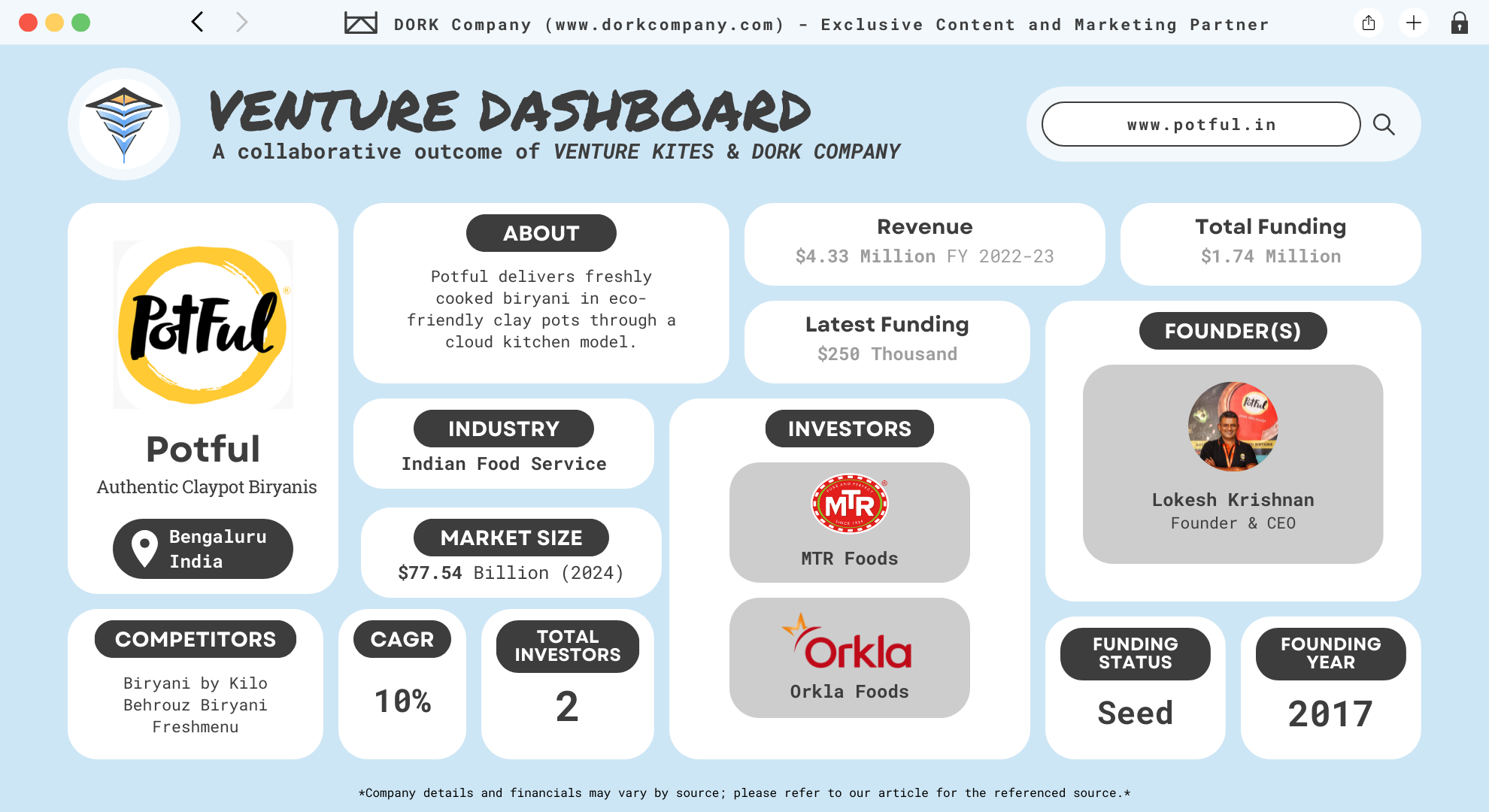Potful : Bringing Sizziling Tradition to Your Table

Who said traditional can’t be trendy? Potful, a visionary startup, marries the age-old charm of biryani with the swift pace of today’s technology. Born in 2017, this Bangalore-based company has swiftly become a frontrunner in the cloud kitchen scene, delivering over 1.5 million biryanis, each packed in an eco-friendly clay pot that guarantees a taste as authentic as the recipes passed down through generations. (Potful)
The startup uses a cloud kitchen model, which means they focus solely on delivery rather than running traditional dine-in restaurants. This allows Potful to operate efficiently, reduce overhead costs, and pass those savings on to the customer. With over 20 cloud kitchens in major cities like Bangalore, Hyderabad, and Chennai, Potful is scaling rapidly while maintaining high standards of quality.
Potful leverages technology to offer a menu that’s both diverse and distinctly rooted in Indian culinary traditions. Potful’s model is straightforward yet effective. It uses an online platform that allows customers to order from a variety of biryanis—each representing a different part of India.
Pot to Fortune: The Tale of Potful’s Passionate Founder
Ever wonder what happens when a die-hard biryani lover decides to disrupt the food industry? Meet Lokesh Krishnan, the man behind Potful. Lokesh is a seasoned entrepreneur with a passion for authentic Indian food, especially biryani. In 2017, he turned his culinary obsession into a thriving business, launching Potful in Bangalore.
Who is Lokesh Krishnan?
Before diving into the food industry, Lokesh had a successful career in technology. He worked for over 15 years in various leadership roles across global companies, like Amul and Metro. But despite a flourishing tech career, his heart was set on something closer to home—bringing the authentic flavors of India to people’s doorsteps. (Lokesh Krishnan)
The Birth of Potful
The idea for Potful was born out of a simple yet powerful insight. Lokesh realized that while biryani is one of India’s most beloved dishes, the way it was being delivered didn’t do justice to its rich flavors. Most restaurants either bulk-prepared it or reheated it before delivery, which compromised the taste and texture. Lokesh wanted to change that. He envisioned a model where every biryani is cooked fresh in a traditional clay pot, sealed, and delivered to the customer in the same pot.Driven by this vision, Lokesh set up the first cloud kitchen in Bangalore. The model was straightforward yet innovative: centralize cooking in cloud kitchens, use technology to streamline orders, and ensure that every biryani delivered was not only delicious but also environmentally conscious. Today, Potful operates over 20 cloud kitchens and has served over 1.5 million biryanis, making Lokesh’s dream a reality. (Your Story)
A Billion Dollar Feast: India’s Booming Foodservice Market
The Indian foodservice market is a hotbed of opportunity, with a growth trajectory that’s leaving investors salivating. It is projected to grow robustly from USD 77.54 billion in 2024 to USD 125.06 billion by 2029 with a CAGR of 10.03%. This market expansion is fueled by a young, tech-savvy population whose appetites are as diverse as their cultural heritage. (Mordor Intelligence)
Dining Out on a Digital Revolution
The rise of cloud kitchens and online delivery platforms like Swiggy and Zomato has revolutionized the way Indians dine. With a record of thousands of orders per minute, these platforms are not just feeding hungry customers; they’re reshaping the entire dining ecosystem. The market’s growth is further boosted by a surge in standalone establishments that offer unique dining experiences and cater to the evolving tastes of Indian consumers, focusing on regional specialties and creative fusion cuisines (Custom Market Insights).
Culinary Diversity at Its Best
The trend extends beyond traditional restaurants to include cafes, bars, and even street food vendors that provide quick, delicious bites. This shift is supported by an increase in health-conscious dining options, with a rising demand for vegetarian, vegan, and organic dishes. Foodservice providers are tapping into this trend, offering menus that cater to a health-aware clientele looking for both taste and nutritional value.
The Technology Table
Technology is at the heart of this culinary transformation. Many foodservice operators are embracing digital tools to streamline operations and enhance customer experiences. From automated ordering systems to tech-driven food preparation, technology is helping restaurants increase efficiency and reduce costs, making it easier to delight diners with every meal.
Mission Delicious: Potful’s Vision of Flavor and Sustainability
Potful’s mission is clear: to be the world’s most loved and largest biryani brand. The company is obsessed with quality and tradition, aiming to deliver the freshest, most authentic biryani to customers across India. (About)
Vision: Preserving Tradition with Innovation
The vision of Potful is to preserve the rich culinary heritage of India while embracing modern technology. They aim to blend traditional cooking methods with contemporary delivery solutions to ensure that every biryani they serve is as fresh and flavorful as if it were made at home.
Problems They Solve: Freshness, Authenticity, and Sustainability
One of the biggest challenges in the food delivery industry is maintaining the freshness and quality of food during transit. Potful tackles this by cooking each biryani in an earthen pot, which not only locks in the flavors but also keeps the food warm until it reaches the customer. Additionally, by using a cloud kitchen model, Potful reduces the carbon footprint associated with traditional dine-in restaurants. This approach solves the problem of food wastage and ensures that customers receive a meal that’s both delicious and environmentally friendly.
Clay, Cook, and Deliver: Potful’s Recipe for Success
At Potful, every biryani starts its journey in a clay pot, prepared fresh upon order, capturing the essence of traditional Indian kitchens while delivering right to your doorstep. With operations spread across Bangalore, Hyderabad, and Chennai, Potful employs a cloud kitchen model, focusing purely on delivery without the overhead of dine-in facilities. This strategy allows them to optimize each kitchen’s output and maintain quality across every dish served.
A Menu of Delights
Potful’s menu, though focused, is vast in variety, offering biryanis from different parts of India—each with its distinct preparation and flavor profile. From the classic Hyderabadi to the aromatic Lucknowi, Potful ensures that the regional authenticity of these dishes remains intact. They also offer a range of tandoori starters and Indian desserts.
Operation and Expansion: A Strategy for Growth
Since its inception, Potful has not only focused on culinary excellence but also on expanding its footprint. Each kitchen is strategically located to maximize delivery efficiency, ensuring that every order is just a few minutes away from being at your door. The company has set a robust foundation, allowing it to scale quickly while maintaining the unique selling proposition of fresh, handi-cooked biryanis delivered in eco-friendly packaging.
Potful’s Impact : Stirring Up the Competition
Potful’s business model, centered around delivering authentic biryanis in eco-friendly clay pots, sets it apart in a crowded market and has won it both acclaim and loyal customers. In 2024, Potful was recognized as the Startup of the Year – Cloud Kitchen by FFCC. (FFCC)
At the Dun & Bradstreet Leap India Startup Summit 2024, Potful was named one of the Startup Trailblazers of India. Potful’s impact extends beyond awards; it has redefined how Indian cuisine can be delivered. With over 1.5 million biryanis served, Potful has tapped into the growing demand for quality food delivery, setting new standards in the industry. (D&B Summit)
One of the most notable collaborations is with Thums Up and Disney+ Hotstar for the “Toofani Biryani Hunt” series. This partnership, featuring celebrity chef Ranveer Brar, showcases the diverse and rich history of biryani across India. The collaboration not only increased Potful’s visibility but also positioned it as a cultural icon, celebrating India’s love for biryani. (Toofani Biryani Hunt)
Potful has also partnered with local artisans to produce the clay pots in which their biryanis are cooked and delivered. This collaboration supports over 100 artisans, ensuring that traditional craftsmanship thrives while also contributing to the brand’s eco-friendly ethos.Another critical aspect of Potful’s growth strategy is its partnership with food delivery giants like Swiggy and Zomato. These collaborations have enabled Potful to reach a broader audience, leveraging the vast customer base and advanced logistics of these platforms to deliver their signature biryanis across multiple cities.
Raising the Dough: Potful’s Financial Rise in the Biryani Business
Potful’s journey from a modest startup to a rising star in India’s food industry is fueled by strategic funding and impressive revenue growth. Founded in 2017, Potful has managed to raise a total of $1.74 million across three seed funding rounds, propelling the brand to a valuation of $15 million by December 2022. (PitchBook)
Funding Timeline
- December 27, 2018: Potful secured its first seed funding of $314,000, which marked the beginning of its growth trajectory. This round, led by MTR Foods, valued the company at approximately $3.1 million.
- July 15, 2019: The company raised an additional $1.2 million in a second seed round, pushing its post-money valuation to $7.2 million. This significant infusion of capital allowed Potful to expand its operations and further establish its presence in key markets.
- December 7, 2022: Potful’s most recent seed round brought in $250,000, driving its valuation up to $15 million. The funding, again led by MTR Foods, reflects the company’s growing influence in the food industry and its successful business model.
Revenue Growth
Potful’s financial performance has been nothing short of spectacular. The company’s revenue has shown consistent growth, with the fiscal year 2022-23 seeing revenue of approximately $4.33 million (₹34.72 crores). This marks a significant leap from its earlier years, where revenue was recorded at $2.19 million in FY 2021-22 and $1.03 million in FY 2020-21 (Tracxn).
Full Plate, Bright Future: What’s Next for Potful
Potful’s journey from a single kitchen to a multi-city biryani powerhouse is a story of passion, innovation, and perseverance. Founded in 2017, Potful has quickly established itself as a leader in the Indian foodservice industry, delivering authentic, freshly cooked biryanis that resonate with the diverse tastes of India.
Potful’s journey from a small startup to a major player in the biryani market is proof that with the right vision and execution, anything is possible. If you have a passion project, now’s the time to pursue it. Who knows? Your idea could be the next big success story we are writing about.
Start sketching out your business plan, find your niche, and dive into your entrepreneurial journey. And while you’re at it, stay informed and inspired by checking out other success stories and business tips on Venture Kites. Your next big idea could be just one article away from becoming a reality.
At a Glance with DORK Company

Dive In with Venture Kites
Lessons From Potful
Embrace Tradition with a Modern Twist
The Lesson & Why it Matters: Honoring tradition while embracing modern technology creates a unique value proposition. It appeals to both nostalgic and contemporary customers.
Implementation: Incorporate traditional elements into your product or service while using modern methods to enhance convenience and accessibility.
How Potful Implements It: Potful combines the traditional method of cooking biryani in clay pots with a modern cloud kitchen model, ensuring both authenticity and efficiency in their operations.
Sustainability as a Core Value
The Lesson & Why it Matters: Incorporating sustainability into your business model not only benefits the environment but also attracts eco-conscious consumers.
Implementation: Adopt eco-friendly practices in production, packaging, and operations. Highlight these practices in your marketing to build a responsible brand image.
How Potful Implements It: Potful uses eco-friendly clay pots for cooking and delivering biryani, reducing plastic waste and supporting local artisans, which resonates with today’s environmentally conscious consumers.
Capital Efficiency
The Lesson & Why it Matters: Using capital wisely ensures that a business can grow sustainably without overextending itself financially.
Implementation: Focus on scaling operations efficiently, reinvesting profits wisely, and avoiding unnecessary expenditures.
How Potful Implements It: Despite limited funding, Potful has achieved significant growth by being capital efficient, focusing on profitable expansion rather than rapid, unsustainable scaling.
Think Big, Act Locally
The Lesson & Why it Matters: While having a broad vision is important, tailoring your approach to local markets can lead to more effective growth.
Implementation: Customize your offerings and marketing strategies to align with local cultures, tastes, and needs.
How Potful Implements It: Potful has grown its brand by tailoring its biryani offerings to the specific tastes of different regions, while maintaining a vision of becoming a pan-India biryani brand.
Focus on Quality
The Lesson & Why it Matters: Quality should never be compromised. High standards build customer trust and loyalty, which are crucial for long-term success.
Implementation: Invest in high-quality ingredients, skilled labor, and thorough quality checks to maintain the integrity of your product or service.
How Potful Implements It: Potful prioritizes using fresh ingredients and traditional cooking methods, ensuring that each biryani meets the highest standards of taste and quality.
Author Details
Creative Head – Mrs. Shemi K Kandoth
Content By Dork Company
Art By Dork Company
Instagram Feed
X (Twitter) Feed
Discover the tasty evolution of authentic claypot biryanis with @PotfulBiryani . Explore how they are transforming traditional flavors with an eco-friendly approach.
— Venture Kites (@VentureKites) October 16, 2024
Full Story @VentureKites https://t.co/Qk9iwCmgIY
Proudly crafted with @dorkcompany_ – https://t.co/9nMJIiMPU9 pic.twitter.com/9WsLoYaRW4












